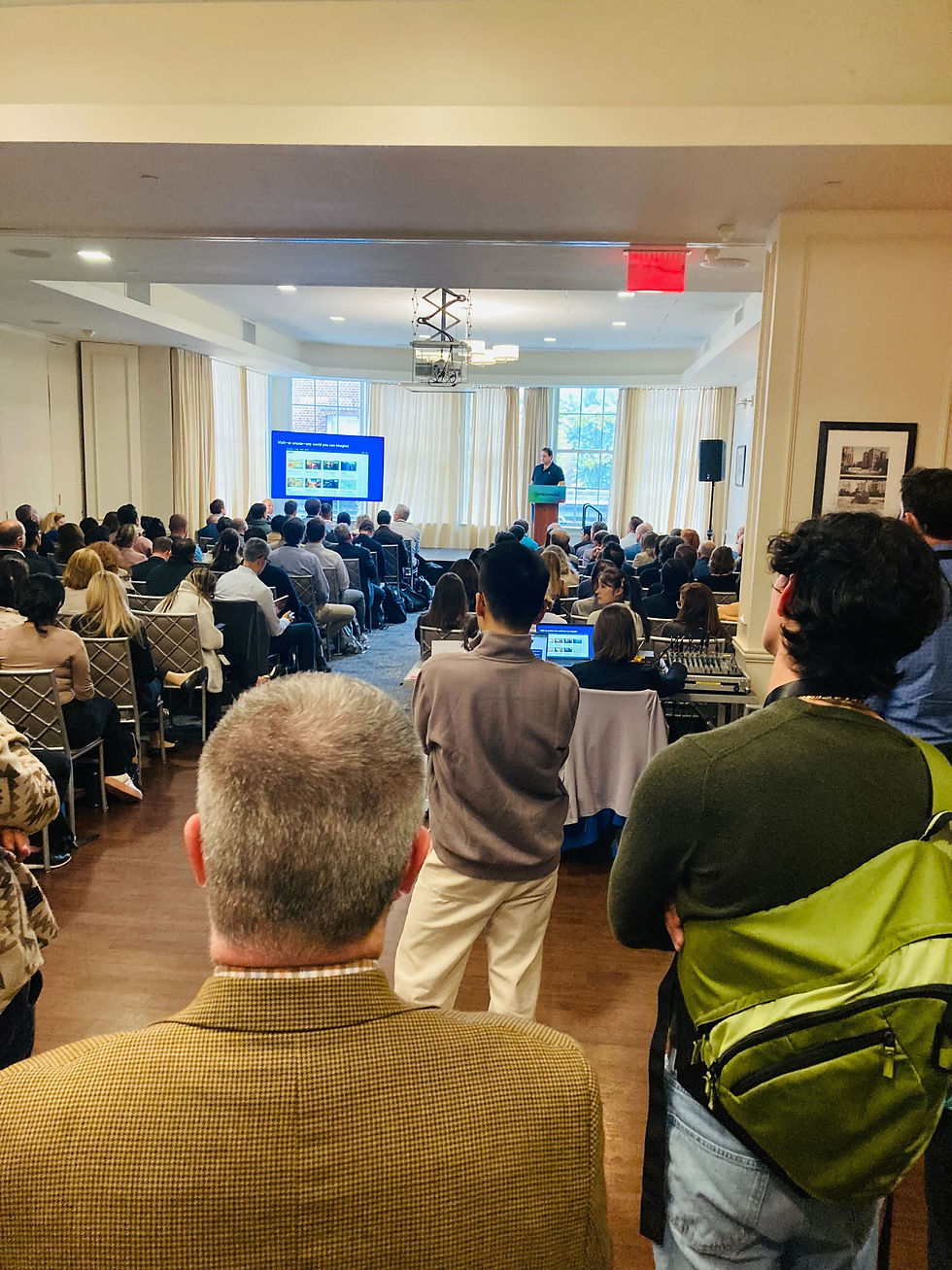EdTechWeek AI for Educators Summit 2025
- Rina Deshpande
- Oct 27, 2025
- 4 min read

I recently attended the 2025 EdTechWeek AI for Educators Summit hosted at Teachers College Columbia University on October 20, 2025.
This one-day opportunity was free of cost for “K-20” educators ranging from kindergarten teachers to graduate-level faculty and administration. The program included expert guest speakers, workshops, a hands-on expo, networking opportunities, and AI-powered pitches in a Shark Tank experience.
Overall, I gained valuable best practices and mindsets from experts to shape responsible, effective use of AI in education.
I highlight a few here:
Expert-Led Panels

I first attended the panel, “The Pedagogical Shift is Here: What Educators and Businesses can Learn from Each Other about Leveraging AI Fluency for Growth.”
Panel guests included Jenny Maxwell, Head of Grammarly for Education, James Genone, Senior Vice Chancellor for Learning Strategy at Northeastern University, Thomas Blaylock, Clinical Professor of Public Policy at the Robert F. Wagner School of Public Service, and Alexandra Walsh, Chief Product Officer at Amplify Education.
Having experts from an AI-forward company such as Grammarly as well as K-12 and university-level leaders concretely bridged education and with corporation, underscoring a “professional matchmaking process” between students and employers. Education therefore must equip students to have domain-specific knowledge and critical thinking skills, and must provide students opportunities to apply and innovate learning with AI-powered tools across all ages.
“There is currently no foolproof curriculum for AI. Our role as educators is to project and shape disruption in industries, not lament it,” explained Genone. For this reason, each of the panel guests encouraged educators to actively collaborate with students to shape responsible, productive use of AI in learning, including collaboratively shaping AI policies in the classroom.

I also attended the session, “The Jobs Are Already Disappearing — Are Schools Ready?” with guest speaker, Jane Martínez Dowling, Chief, Office of Student Pathways New York City Public Schools. Alex Kotran, CEO & Co-Founder of the AI Education Project, moderated the Q+A format.
Dowling began her career as an educator and leader as a founding Teach for America Corps member, and highlighted “industry learning” to ensure students are prepared for the labor market.
“Jobs are starting to disappear. What can we do about it?” asked Kotran.
“The number of jobs has not decreased as of yet,” Dowling corrected. “Rather, the nature of new jobs today requires skills such as the ability to train and utilize artificial intelligence productively on a team,” she shared.
In order to prepare students for jobs and reduce the risk of being replaced by AI, she suggests the following focus areas in primary, secondary, and higher education:
AI literacy: The knowledge and skills of how to use various AI tools to support creativity and productivity, developed through intentional practice.
Critical thinking: The ability to evaluate and shape AI-generated outputs toward a purpose.
Communication and collaboration: The skills to communicate and collaborate virtually and in-person in academic and workplace environments.
I appreciated Dowling’s background as a NYC public school teacher considering the same start to my own career. Her strategic suggestions for shaping industry-led learning are to support accessibility and advancement opportunities for all students, a top priority at NYU SPS.
EdTech Week Expo

The ongoing hands-on Expo featured exhibitors with AI-powered tools to enhance education, ranging across elementary literacy instruction to research in higher education. Tools such as Muzzy Lane can help educators develop AI-powered simulation-based assessments, allowing students to interact and roleplay knowledge and skills. Its built-in AI-generated feedback can be reviewed and modified by the teacher or professor before students receive it, supporting strategic “human-in-the-loop” use of AI.
As a learning designer in higher education, I was particularly interested in AI-enhanced tools such as Scrible which simplify qualitative and quantitative research for students and faculty. This tool claims to prevent plagiarism with auto-generated citations, instant APA and MLA formatting of references, auto-gathered annotations, suggested resources, and more.
As a former graduate student and Assistant Professor of Practice of Elementary Education, I value the importance of crediting sources and individuals, and I can also recall times when I felt fatigued by painstaking tasks such as formatting references when I wanted to preserve energy to “get to the creative thinking.” As the precision of these AI-powered tools continues to evolve, students and faculty can credit intellectual property, spending less time on text formatting and more time on analyzing and innovating!
Shark Tank Experience

It was standing room only in the EdTech Week Shark Tank experience. Seven brave presenters pitched AI-powered tools ranging from the gamification of settings in literature in k-12 education, to corporate healthcare training models which would allow mental health professionals to practice relevant skills in emergency situations. During each of the pitches, I noticed themes of simulation and skill-building related to human interaction using AI as well as tailored learning language models (LLMs) using licensed content. I am eager to learn who won.
As I left the 2025 EdTechWeek AI For Educators Summit, I felt a connection to fellow educators (including former colleagues!) and an amplified commitment to shape ethical, innovative use of AI in education.
I also walked away with my badge of attendance. Perhaps it was generated by AI, but it gave this human a real sense of accomplishment and an eye toward continued learning.

Photo credits: Rina Deshpande, EdTech Week 2025



Comments